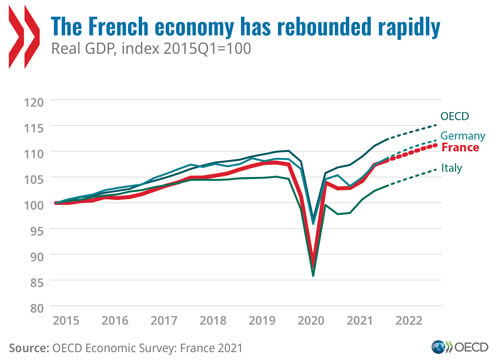18/11/2021 – Swift and effective government support has helped France to rebound rapidly from its COVID19-induced recession. Using the country’s announced Recovery and Investment Plans to invest in education, worker training, and the green and digital transitions should result in stronger and more resilient growth, according to a new OECD report.
The latest OECD Economic Survey of France says that while it is important not to prematurely withdraw support for households and firms, as the recovery gains traction support measures should increasingly be targeted at the most viable businesses and sectors and should favour investment. Professional training and support for workers transitioning to new jobs should be strengthened to ease labour market shortages and address the mismatch between skills and the needs of the business sector.
“France’s response to the COVID-19 crisis has been swift and effective, enabling it to emerge from the health crisis with jobs and household incomes well protected and its economic capacity largely preserved,” OECD Secretary-General Mathias Cormann said, launching the Survey alongside French Minister of Economy, Finance and Recovery Bruno Le Maire. “A rigorous implementation of the government’s Recovery and Investment Plans will help to turn the rebound into lasting sustained growth, building a greener, more digital and more resilient economy.”
 After an 8.0% contraction in economic activity in 2020, the Survey projects a strong GDP rebound of 6.8% in 2021 and 4.2% in 2022 as domestic demand resumes. This follows a period of slower growth in France in the decade leading up to the COVID-19 crisis marked by weak gains in productivity and living standards. Low-skilled and young workers face difficulties in accessing the labour market and unequal opportunities have weakened inter-generational social mobility. The pandemic has also exposed a lag among small and medium-sized enterprises in adopting digital technologies.
After an 8.0% contraction in economic activity in 2020, the Survey projects a strong GDP rebound of 6.8% in 2021 and 4.2% in 2022 as domestic demand resumes. This follows a period of slower growth in France in the decade leading up to the COVID-19 crisis marked by weak gains in productivity and living standards. Low-skilled and young workers face difficulties in accessing the labour market and unequal opportunities have weakened inter-generational social mobility. The pandemic has also exposed a lag among small and medium-sized enterprises in adopting digital technologies.
These structural weaknesses can only be addressed through reforms, the Survey says. It calls for renewed efforts to boost skills to help sustain jobs and productivity growth. A combination of labour market, taxation and spending reforms could lead to a tangible increase in living standards in the years ahead, according to the Survey.
It is particularly important to use the recovery period to improve the fiscal framework and notably the effectiveness of public spending through reviews and better allocation of resources, the Survey says. France’s public spending as a share of GDP is the highest of OECD countries, and the high level of social expenditures, notably on pensions, as well as looming pressure from an ageing population makes it vital to rebalance spending towards more investment. This would support growth and help to stabilise and then gradually lower the public debt-to-GDP ratio.
The government has already pursued important reforms to reduce labour market segmentation and strengthen active labour market policies. Ensuring broad access to retraining and enforcing high quality standards for lifelong training courses would boost employment opportunities.
France has made the transition towards a greener economy a pillar of its recovery plan, and it is vital that this leads to increased private investment in green infrastructure and technology. Greater incentives are needed to drive behavioural changes within businesses and households. To be fully effective, this should extend to all available policy instruments, including regulation and R&D as well as progressively aligning carbon prices across sectors, albeit alongside complementary measures. To avoid unfair impacts on people and sectors, it is essential to support vulnerable households and firms, through targeted measures, for example help-to-buy schemes for clean vehicles and equipment.
See a Survey Overview with key findings and charts (this link can be used in media articles).
For further information, journalists are invited to contact Catherine Bremer in the OECD Media Office (+33 1 45 24 80 97).
Working with over 100 countries, the OECD is a global policy forum that promotes policies to preserve individual liberty and improve the economic and social well-being of people around the world
Follow this news feed: OECD - Global





